Case Analysis: Barry Spurr v New Matilda - Public Relations Law
VerifiedAdded on 2023/04/04
|6
|1321
|376
Report
AI Summary
This report provides a comprehensive analysis of the Barry Spurr v New Matilda case, focusing on the legal issues surrounding privacy and confidentiality within the context of public relations law. The case involves a professor's derogatory emails published by New Matilda, leading to legal proceedings. The report examines the legal issues, including the breach of privacy and confidentiality, and explores relevant Australian laws such as the Privacy Act 1988 (Cth) and the International Covenant on Civil and Political Rights. The analysis considers the enforceability of privacy claims, the balance between public interest and privacy rights, and the absence of a specific tort of invasion of privacy in Australian law. The report concludes that the publication of the emails could not be challenged based on privacy grounds, highlighting the weaknesses in Australian privacy laws and the need for reform. The analysis also emphasizes the need to balance individual privacy rights with the broader public interest, especially when offensive or derogatory content is involved. The report provides recommendations for strengthening privacy laws to prevent misuse and protect those affected by breaches of confidentiality.
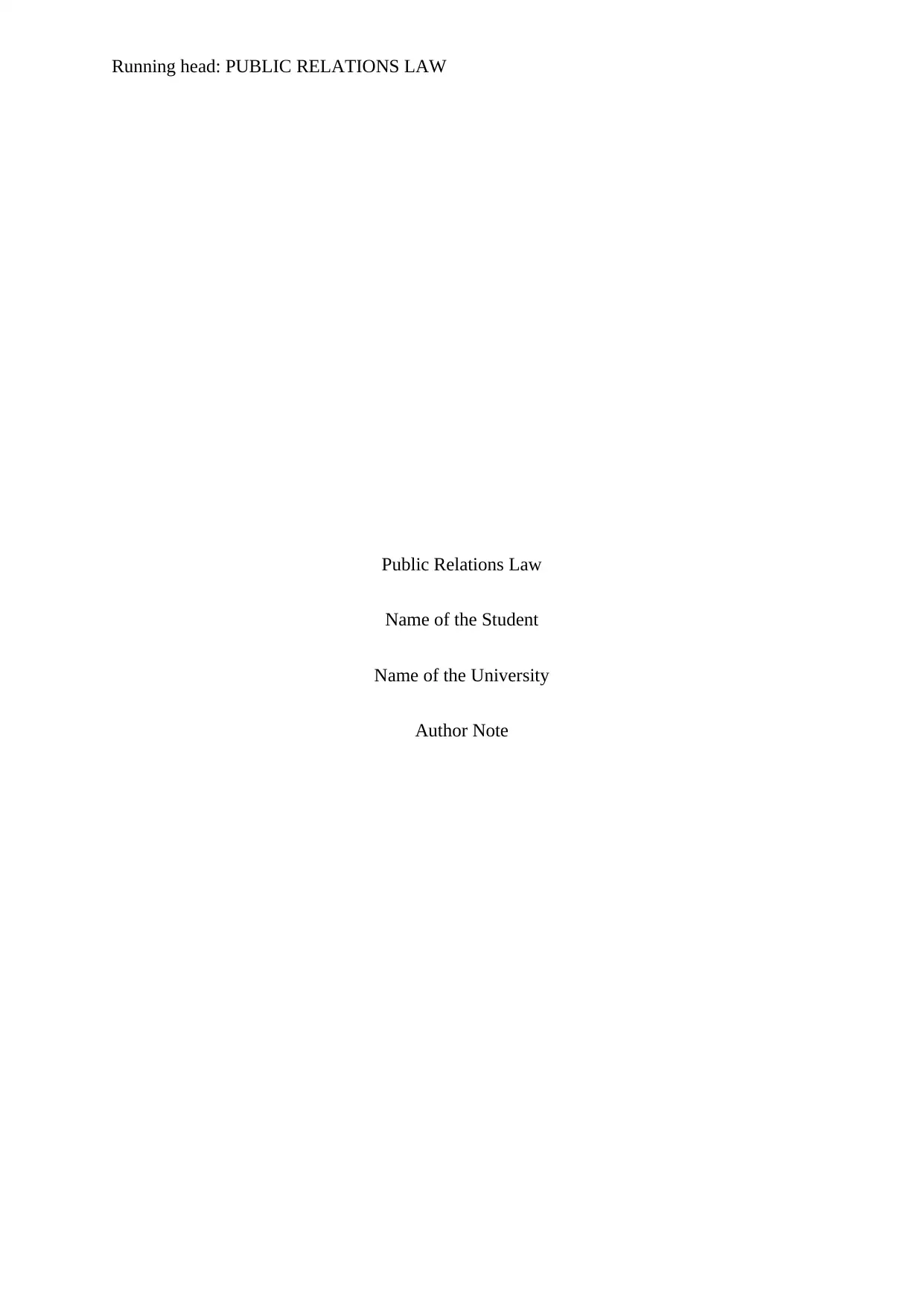
Running head: PUBLIC RELATIONS LAW
Public Relations Law
Name of the Student
Name of the University
Author Note
Public Relations Law
Name of the Student
Name of the University
Author Note
Paraphrase This Document
Need a fresh take? Get an instant paraphrase of this document with our AI Paraphraser
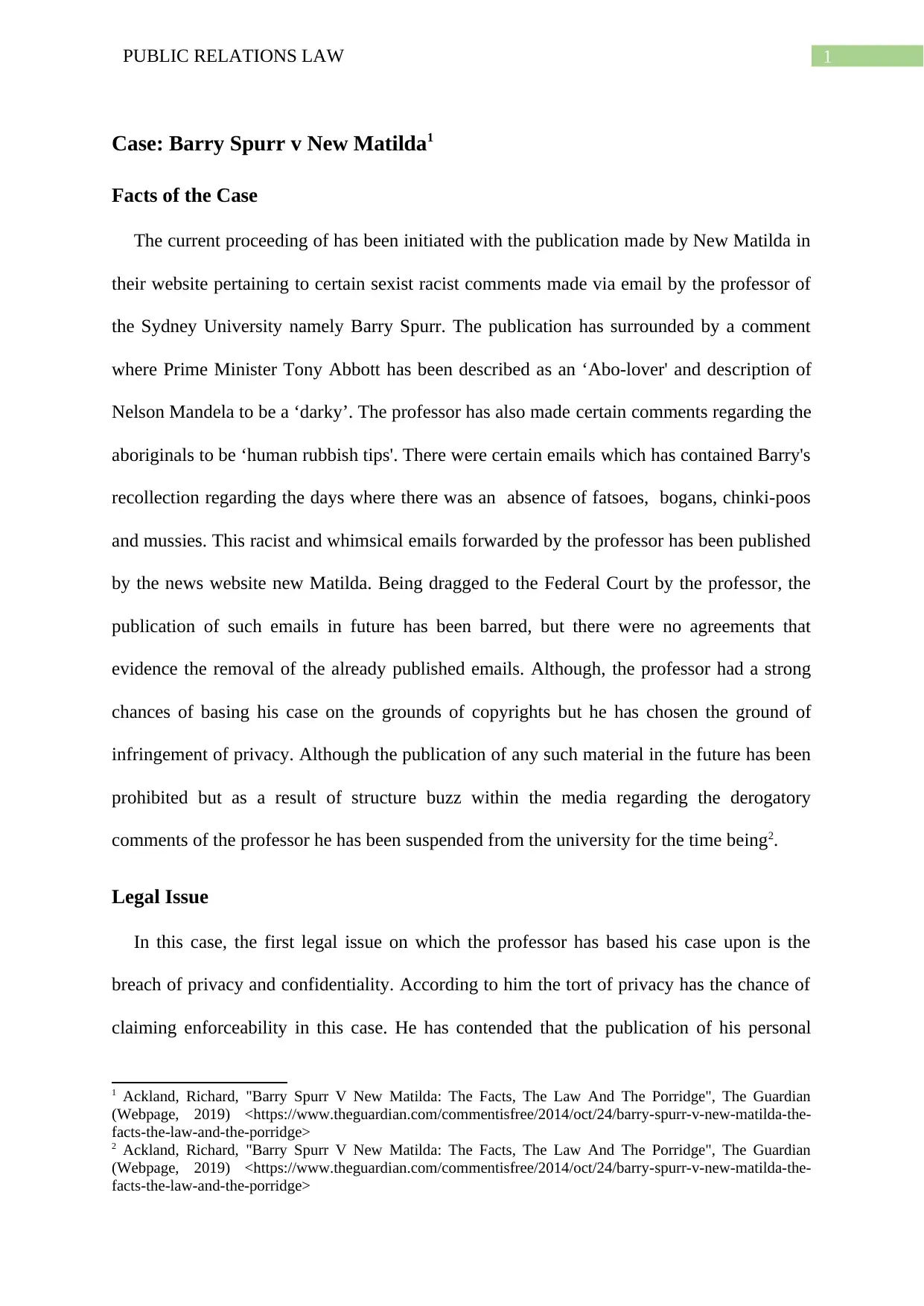
1PUBLIC RELATIONS LAW
Case: Barry Spurr v New Matilda1
Facts of the Case
The current proceeding of has been initiated with the publication made by New Matilda in
their website pertaining to certain sexist racist comments made via email by the professor of
the Sydney University namely Barry Spurr. The publication has surrounded by a comment
where Prime Minister Tony Abbott has been described as an ‘Abo-lover' and description of
Nelson Mandela to be a ‘darky’. The professor has also made certain comments regarding the
aboriginals to be ‘human rubbish tips'. There were certain emails which has contained Barry's
recollection regarding the days where there was an absence of fatsoes, bogans, chinki-poos
and mussies. This racist and whimsical emails forwarded by the professor has been published
by the news website new Matilda. Being dragged to the Federal Court by the professor, the
publication of such emails in future has been barred, but there were no agreements that
evidence the removal of the already published emails. Although, the professor had a strong
chances of basing his case on the grounds of copyrights but he has chosen the ground of
infringement of privacy. Although the publication of any such material in the future has been
prohibited but as a result of structure buzz within the media regarding the derogatory
comments of the professor he has been suspended from the university for the time being2.
Legal Issue
In this case, the first legal issue on which the professor has based his case upon is the
breach of privacy and confidentiality. According to him the tort of privacy has the chance of
claiming enforceability in this case. He has contended that the publication of his personal
1 Ackland, Richard, "Barry Spurr V New Matilda: The Facts, The Law And The Porridge", The Guardian
(Webpage, 2019) <https://www.theguardian.com/commentisfree/2014/oct/24/barry-spurr-v-new-matilda-the-
facts-the-law-and-the-porridge>
2 Ackland, Richard, "Barry Spurr V New Matilda: The Facts, The Law And The Porridge", The Guardian
(Webpage, 2019) <https://www.theguardian.com/commentisfree/2014/oct/24/barry-spurr-v-new-matilda-the-
facts-the-law-and-the-porridge>
Case: Barry Spurr v New Matilda1
Facts of the Case
The current proceeding of has been initiated with the publication made by New Matilda in
their website pertaining to certain sexist racist comments made via email by the professor of
the Sydney University namely Barry Spurr. The publication has surrounded by a comment
where Prime Minister Tony Abbott has been described as an ‘Abo-lover' and description of
Nelson Mandela to be a ‘darky’. The professor has also made certain comments regarding the
aboriginals to be ‘human rubbish tips'. There were certain emails which has contained Barry's
recollection regarding the days where there was an absence of fatsoes, bogans, chinki-poos
and mussies. This racist and whimsical emails forwarded by the professor has been published
by the news website new Matilda. Being dragged to the Federal Court by the professor, the
publication of such emails in future has been barred, but there were no agreements that
evidence the removal of the already published emails. Although, the professor had a strong
chances of basing his case on the grounds of copyrights but he has chosen the ground of
infringement of privacy. Although the publication of any such material in the future has been
prohibited but as a result of structure buzz within the media regarding the derogatory
comments of the professor he has been suspended from the university for the time being2.
Legal Issue
In this case, the first legal issue on which the professor has based his case upon is the
breach of privacy and confidentiality. According to him the tort of privacy has the chance of
claiming enforceability in this case. He has contended that the publication of his personal
1 Ackland, Richard, "Barry Spurr V New Matilda: The Facts, The Law And The Porridge", The Guardian
(Webpage, 2019) <https://www.theguardian.com/commentisfree/2014/oct/24/barry-spurr-v-new-matilda-the-
facts-the-law-and-the-porridge>
2 Ackland, Richard, "Barry Spurr V New Matilda: The Facts, The Law And The Porridge", The Guardian
(Webpage, 2019) <https://www.theguardian.com/commentisfree/2014/oct/24/barry-spurr-v-new-matilda-the-
facts-the-law-and-the-porridge>
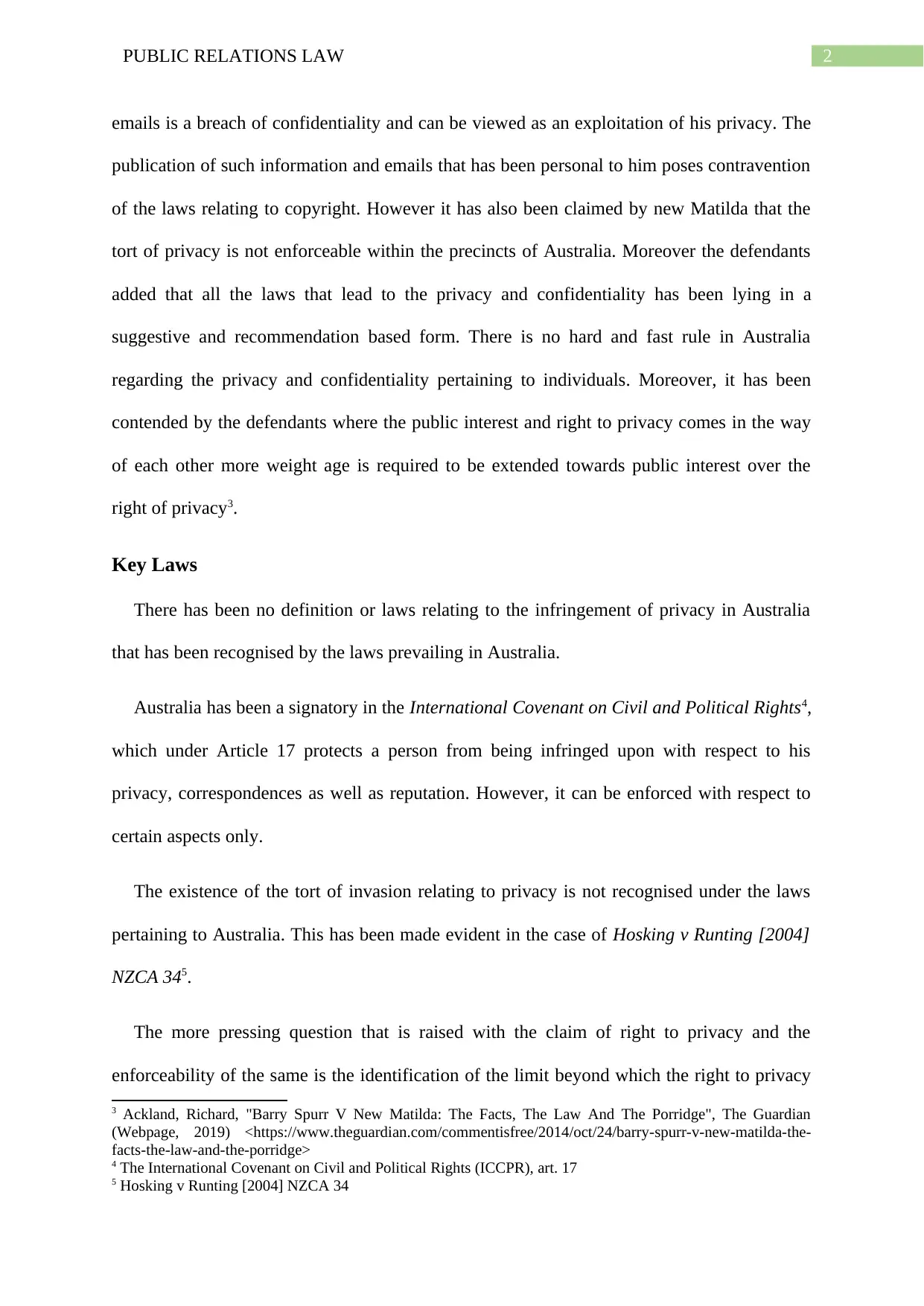
2PUBLIC RELATIONS LAW
emails is a breach of confidentiality and can be viewed as an exploitation of his privacy. The
publication of such information and emails that has been personal to him poses contravention
of the laws relating to copyright. However it has also been claimed by new Matilda that the
tort of privacy is not enforceable within the precincts of Australia. Moreover the defendants
added that all the laws that lead to the privacy and confidentiality has been lying in a
suggestive and recommendation based form. There is no hard and fast rule in Australia
regarding the privacy and confidentiality pertaining to individuals. Moreover, it has been
contended by the defendants where the public interest and right to privacy comes in the way
of each other more weight age is required to be extended towards public interest over the
right of privacy3.
Key Laws
There has been no definition or laws relating to the infringement of privacy in Australia
that has been recognised by the laws prevailing in Australia.
Australia has been a signatory in the International Covenant on Civil and Political Rights4,
which under Article 17 protects a person from being infringed upon with respect to his
privacy, correspondences as well as reputation. However, it can be enforced with respect to
certain aspects only.
The existence of the tort of invasion relating to privacy is not recognised under the laws
pertaining to Australia. This has been made evident in the case of Hosking v Runting [2004]
NZCA 345.
The more pressing question that is raised with the claim of right to privacy and the
enforceability of the same is the identification of the limit beyond which the right to privacy
3 Ackland, Richard, "Barry Spurr V New Matilda: The Facts, The Law And The Porridge", The Guardian
(Webpage, 2019) <https://www.theguardian.com/commentisfree/2014/oct/24/barry-spurr-v-new-matilda-the-
facts-the-law-and-the-porridge>
4 The International Covenant on Civil and Political Rights (ICCPR), art. 17
5 Hosking v Runting [2004] NZCA 34
emails is a breach of confidentiality and can be viewed as an exploitation of his privacy. The
publication of such information and emails that has been personal to him poses contravention
of the laws relating to copyright. However it has also been claimed by new Matilda that the
tort of privacy is not enforceable within the precincts of Australia. Moreover the defendants
added that all the laws that lead to the privacy and confidentiality has been lying in a
suggestive and recommendation based form. There is no hard and fast rule in Australia
regarding the privacy and confidentiality pertaining to individuals. Moreover, it has been
contended by the defendants where the public interest and right to privacy comes in the way
of each other more weight age is required to be extended towards public interest over the
right of privacy3.
Key Laws
There has been no definition or laws relating to the infringement of privacy in Australia
that has been recognised by the laws prevailing in Australia.
Australia has been a signatory in the International Covenant on Civil and Political Rights4,
which under Article 17 protects a person from being infringed upon with respect to his
privacy, correspondences as well as reputation. However, it can be enforced with respect to
certain aspects only.
The existence of the tort of invasion relating to privacy is not recognised under the laws
pertaining to Australia. This has been made evident in the case of Hosking v Runting [2004]
NZCA 345.
The more pressing question that is raised with the claim of right to privacy and the
enforceability of the same is the identification of the limit beyond which the right to privacy
3 Ackland, Richard, "Barry Spurr V New Matilda: The Facts, The Law And The Porridge", The Guardian
(Webpage, 2019) <https://www.theguardian.com/commentisfree/2014/oct/24/barry-spurr-v-new-matilda-the-
facts-the-law-and-the-porridge>
4 The International Covenant on Civil and Political Rights (ICCPR), art. 17
5 Hosking v Runting [2004] NZCA 34
⊘ This is a preview!⊘
Do you want full access?
Subscribe today to unlock all pages.

Trusted by 1+ million students worldwide
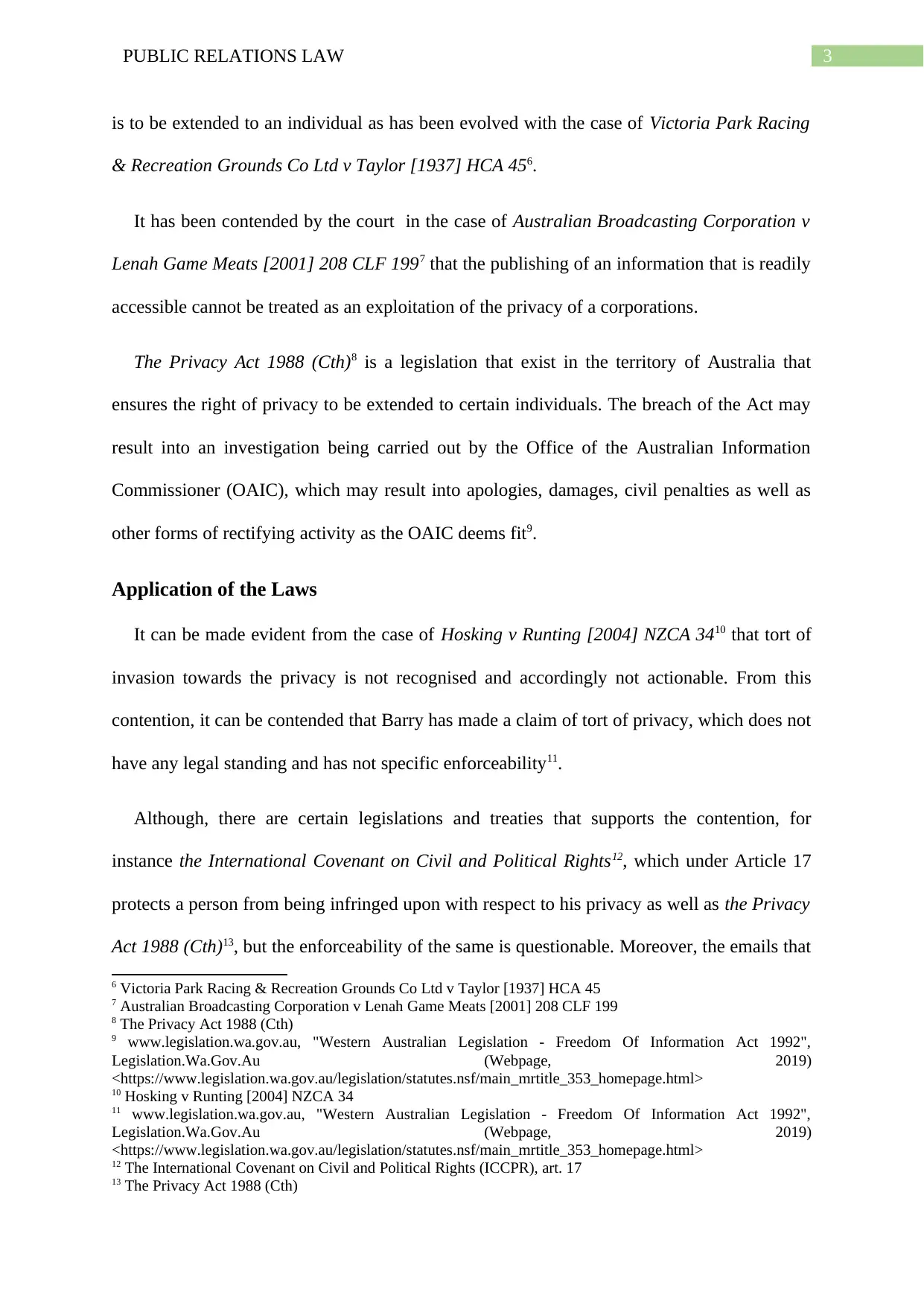
3PUBLIC RELATIONS LAW
is to be extended to an individual as has been evolved with the case of Victoria Park Racing
& Recreation Grounds Co Ltd v Taylor [1937] HCA 456.
It has been contended by the court in the case of Australian Broadcasting Corporation v
Lenah Game Meats [2001] 208 CLF 1997 that the publishing of an information that is readily
accessible cannot be treated as an exploitation of the privacy of a corporations.
The Privacy Act 1988 (Cth)8 is a legislation that exist in the territory of Australia that
ensures the right of privacy to be extended to certain individuals. The breach of the Act may
result into an investigation being carried out by the Office of the Australian Information
Commissioner (OAIC), which may result into apologies, damages, civil penalties as well as
other forms of rectifying activity as the OAIC deems fit9.
Application of the Laws
It can be made evident from the case of Hosking v Runting [2004] NZCA 3410 that tort of
invasion towards the privacy is not recognised and accordingly not actionable. From this
contention, it can be contended that Barry has made a claim of tort of privacy, which does not
have any legal standing and has not specific enforceability11.
Although, there are certain legislations and treaties that supports the contention, for
instance the International Covenant on Civil and Political Rights12, which under Article 17
protects a person from being infringed upon with respect to his privacy as well as the Privacy
Act 1988 (Cth)13, but the enforceability of the same is questionable. Moreover, the emails that
6 Victoria Park Racing & Recreation Grounds Co Ltd v Taylor [1937] HCA 45
7 Australian Broadcasting Corporation v Lenah Game Meats [2001] 208 CLF 199
8 The Privacy Act 1988 (Cth)
9 www.legislation.wa.gov.au, "Western Australian Legislation - Freedom Of Information Act 1992",
Legislation.Wa.Gov.Au (Webpage, 2019)
<https://www.legislation.wa.gov.au/legislation/statutes.nsf/main_mrtitle_353_homepage.html>
10 Hosking v Runting [2004] NZCA 34
11 www.legislation.wa.gov.au, "Western Australian Legislation - Freedom Of Information Act 1992",
Legislation.Wa.Gov.Au (Webpage, 2019)
<https://www.legislation.wa.gov.au/legislation/statutes.nsf/main_mrtitle_353_homepage.html>
12 The International Covenant on Civil and Political Rights (ICCPR), art. 17
13 The Privacy Act 1988 (Cth)
is to be extended to an individual as has been evolved with the case of Victoria Park Racing
& Recreation Grounds Co Ltd v Taylor [1937] HCA 456.
It has been contended by the court in the case of Australian Broadcasting Corporation v
Lenah Game Meats [2001] 208 CLF 1997 that the publishing of an information that is readily
accessible cannot be treated as an exploitation of the privacy of a corporations.
The Privacy Act 1988 (Cth)8 is a legislation that exist in the territory of Australia that
ensures the right of privacy to be extended to certain individuals. The breach of the Act may
result into an investigation being carried out by the Office of the Australian Information
Commissioner (OAIC), which may result into apologies, damages, civil penalties as well as
other forms of rectifying activity as the OAIC deems fit9.
Application of the Laws
It can be made evident from the case of Hosking v Runting [2004] NZCA 3410 that tort of
invasion towards the privacy is not recognised and accordingly not actionable. From this
contention, it can be contended that Barry has made a claim of tort of privacy, which does not
have any legal standing and has not specific enforceability11.
Although, there are certain legislations and treaties that supports the contention, for
instance the International Covenant on Civil and Political Rights12, which under Article 17
protects a person from being infringed upon with respect to his privacy as well as the Privacy
Act 1988 (Cth)13, but the enforceability of the same is questionable. Moreover, the emails that
6 Victoria Park Racing & Recreation Grounds Co Ltd v Taylor [1937] HCA 45
7 Australian Broadcasting Corporation v Lenah Game Meats [2001] 208 CLF 199
8 The Privacy Act 1988 (Cth)
9 www.legislation.wa.gov.au, "Western Australian Legislation - Freedom Of Information Act 1992",
Legislation.Wa.Gov.Au (Webpage, 2019)
<https://www.legislation.wa.gov.au/legislation/statutes.nsf/main_mrtitle_353_homepage.html>
10 Hosking v Runting [2004] NZCA 34
11 www.legislation.wa.gov.au, "Western Australian Legislation - Freedom Of Information Act 1992",
Legislation.Wa.Gov.Au (Webpage, 2019)
<https://www.legislation.wa.gov.au/legislation/statutes.nsf/main_mrtitle_353_homepage.html>
12 The International Covenant on Civil and Political Rights (ICCPR), art. 17
13 The Privacy Act 1988 (Cth)
Paraphrase This Document
Need a fresh take? Get an instant paraphrase of this document with our AI Paraphraser
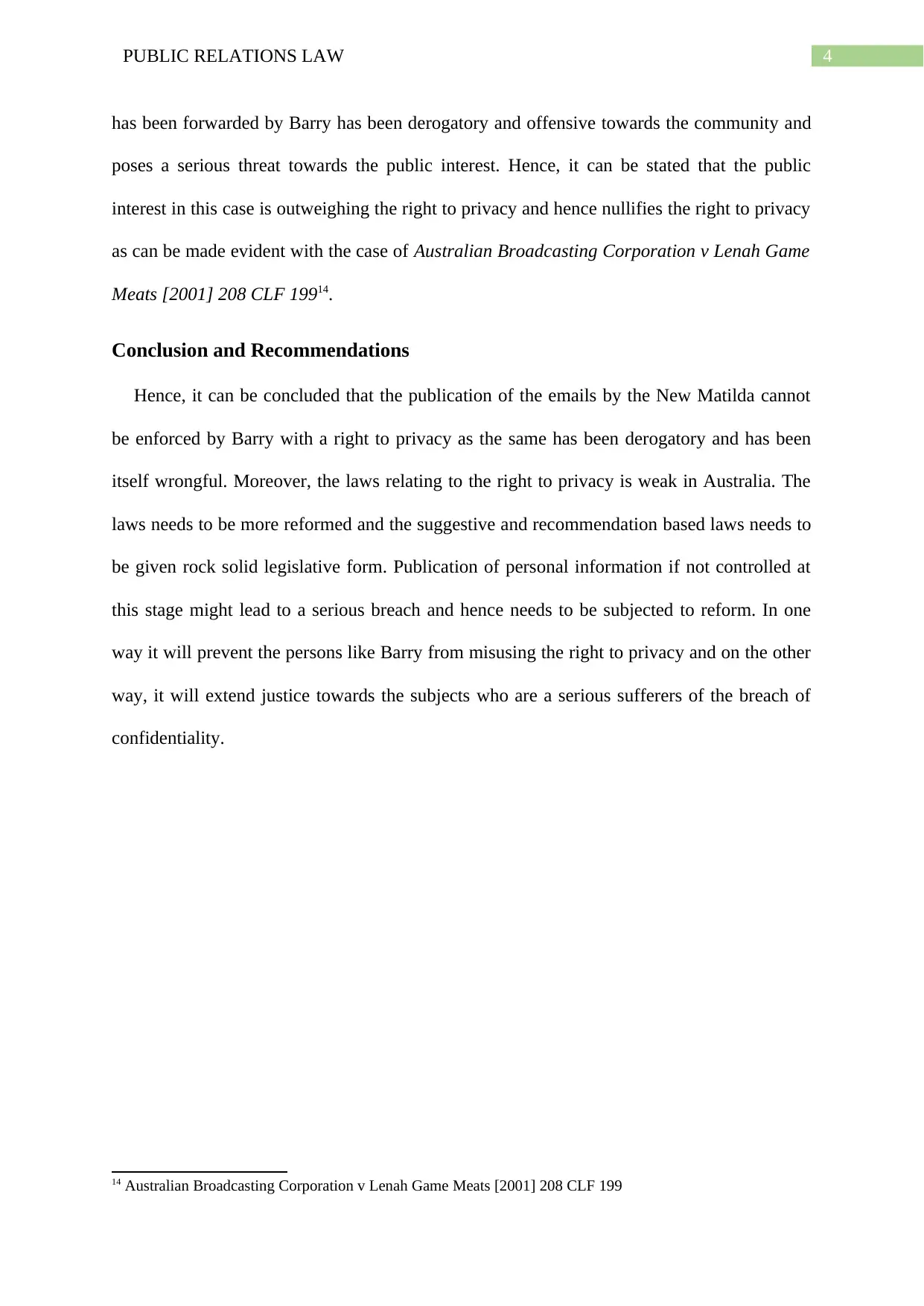
4PUBLIC RELATIONS LAW
has been forwarded by Barry has been derogatory and offensive towards the community and
poses a serious threat towards the public interest. Hence, it can be stated that the public
interest in this case is outweighing the right to privacy and hence nullifies the right to privacy
as can be made evident with the case of Australian Broadcasting Corporation v Lenah Game
Meats [2001] 208 CLF 19914.
Conclusion and Recommendations
Hence, it can be concluded that the publication of the emails by the New Matilda cannot
be enforced by Barry with a right to privacy as the same has been derogatory and has been
itself wrongful. Moreover, the laws relating to the right to privacy is weak in Australia. The
laws needs to be more reformed and the suggestive and recommendation based laws needs to
be given rock solid legislative form. Publication of personal information if not controlled at
this stage might lead to a serious breach and hence needs to be subjected to reform. In one
way it will prevent the persons like Barry from misusing the right to privacy and on the other
way, it will extend justice towards the subjects who are a serious sufferers of the breach of
confidentiality.
14 Australian Broadcasting Corporation v Lenah Game Meats [2001] 208 CLF 199
has been forwarded by Barry has been derogatory and offensive towards the community and
poses a serious threat towards the public interest. Hence, it can be stated that the public
interest in this case is outweighing the right to privacy and hence nullifies the right to privacy
as can be made evident with the case of Australian Broadcasting Corporation v Lenah Game
Meats [2001] 208 CLF 19914.
Conclusion and Recommendations
Hence, it can be concluded that the publication of the emails by the New Matilda cannot
be enforced by Barry with a right to privacy as the same has been derogatory and has been
itself wrongful. Moreover, the laws relating to the right to privacy is weak in Australia. The
laws needs to be more reformed and the suggestive and recommendation based laws needs to
be given rock solid legislative form. Publication of personal information if not controlled at
this stage might lead to a serious breach and hence needs to be subjected to reform. In one
way it will prevent the persons like Barry from misusing the right to privacy and on the other
way, it will extend justice towards the subjects who are a serious sufferers of the breach of
confidentiality.
14 Australian Broadcasting Corporation v Lenah Game Meats [2001] 208 CLF 199
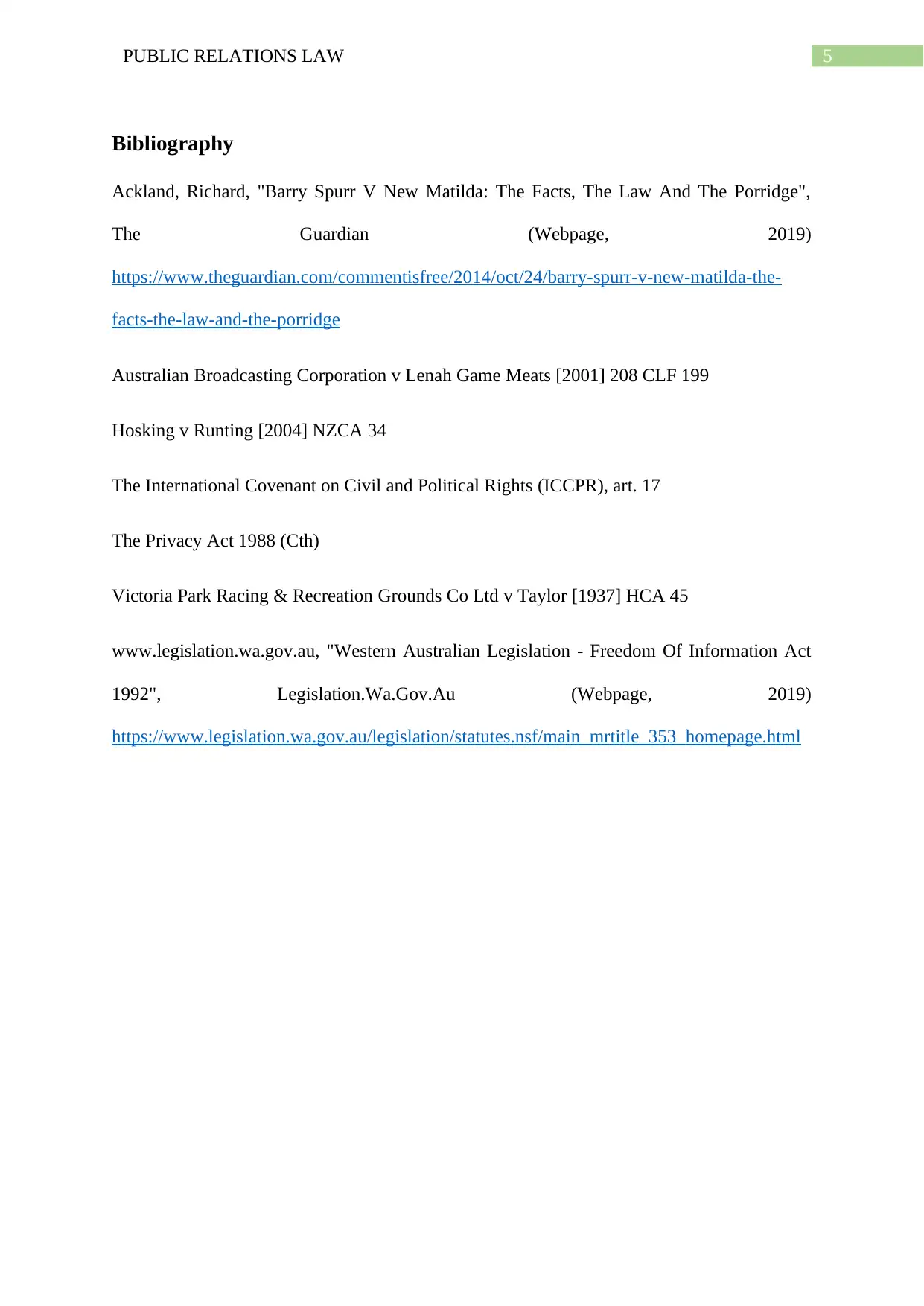
5PUBLIC RELATIONS LAW
Bibliography
Ackland, Richard, "Barry Spurr V New Matilda: The Facts, The Law And The Porridge",
The Guardian (Webpage, 2019)
https://www.theguardian.com/commentisfree/2014/oct/24/barry-spurr-v-new-matilda-the-
facts-the-law-and-the-porridge
Australian Broadcasting Corporation v Lenah Game Meats [2001] 208 CLF 199
Hosking v Runting [2004] NZCA 34
The International Covenant on Civil and Political Rights (ICCPR), art. 17
The Privacy Act 1988 (Cth)
Victoria Park Racing & Recreation Grounds Co Ltd v Taylor [1937] HCA 45
www.legislation.wa.gov.au, "Western Australian Legislation - Freedom Of Information Act
1992", Legislation.Wa.Gov.Au (Webpage, 2019)
https://www.legislation.wa.gov.au/legislation/statutes.nsf/main_mrtitle_353_homepage.html
Bibliography
Ackland, Richard, "Barry Spurr V New Matilda: The Facts, The Law And The Porridge",
The Guardian (Webpage, 2019)
https://www.theguardian.com/commentisfree/2014/oct/24/barry-spurr-v-new-matilda-the-
facts-the-law-and-the-porridge
Australian Broadcasting Corporation v Lenah Game Meats [2001] 208 CLF 199
Hosking v Runting [2004] NZCA 34
The International Covenant on Civil and Political Rights (ICCPR), art. 17
The Privacy Act 1988 (Cth)
Victoria Park Racing & Recreation Grounds Co Ltd v Taylor [1937] HCA 45
www.legislation.wa.gov.au, "Western Australian Legislation - Freedom Of Information Act
1992", Legislation.Wa.Gov.Au (Webpage, 2019)
https://www.legislation.wa.gov.au/legislation/statutes.nsf/main_mrtitle_353_homepage.html
⊘ This is a preview!⊘
Do you want full access?
Subscribe today to unlock all pages.

Trusted by 1+ million students worldwide
1 out of 6
Your All-in-One AI-Powered Toolkit for Academic Success.
+13062052269
info@desklib.com
Available 24*7 on WhatsApp / Email
![[object Object]](/_next/static/media/star-bottom.7253800d.svg)
Unlock your academic potential
Copyright © 2020–2025 A2Z Services. All Rights Reserved. Developed and managed by ZUCOL.
